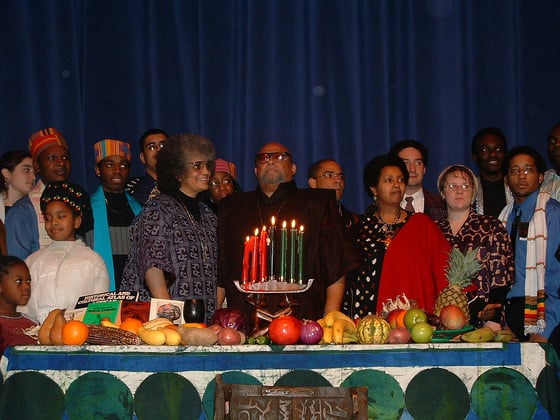History of Kwanzaa & Boxing Day
Kwanzaa and Boxing Day are two holidays some Americans may know little about, but most have seen on the calendar.
Kwanzaa starts today in the USA and is celebrated through January 1, 2015. Boxing Day is observed today in St. Kitts, the United Kingdom, Australia, Canada and many Commonwealth countries (the former colonies of the British Empire).
The UMHS Endeavour takes a brief look at these two holidays for both the general public and students at American and Caribbean medical schools.
Kwanzaa: African-American Celebration December 26 to January 1
The African-American celebration of Kwanzaa is held December 26 to January 1st annually. Kwanzaa, derived from the Swahili phrase “matunda ya kwanza,” which loosely translates to “first fruits,” began in 1966.
Colorful candles are just one of the iconic symbols of Kwanzaa, similar to the Advent candles in many Christian Christmas celebrations (lit on Sundays during the Christmas season to symbolize the “advent” of Christ’s birth, with the final candle lit in church on Christmas Eve, signaling the birth of the savior for Christians).
Kwanzaa candles may also remind some of the beautiful Chanukah candles that Jewish families light on their menorahs during the “Festival of Lights,” commemorating the Maccabees and the miracle of the oil that burned for eight nights in ancient Jerusalem, celebrating a victory over the pagan Syrians that desecrated a temple.
Kwanzaa, however, is a much newer celebration than Advent and Chanukah.
The holiday was started by Dr. Maulauna Karenga, professor and chairman of Black Studies at California State University in Long Beach. History.com gives the following facts about the holiday:
“After the Watts riots in Los Angeles, Dr. Karenga searched for ways to bring African-Americans together as a community,” the History Channel’s History.com says. “He founded US, a cultural organization, and started to research African ‘first fruit’ (harvest) celebrations. Karenga combined aspects of several different harvest celebrations, such as those of the Ashanti and those of the Zulu, to form the basis of Kwanzaa.”
Kwanzaa facts from History.com:
- “On each of the seven nights, the family gathers and a child lights one of the candles on the Kinara (candleholder), then one of the seven principles is discussed.”
- “The principles, called the Nguzo Saba (seven principles in Swahili) are values of African culture which contribute to building and reinforcing community among African-Americans.”
- “Kwanzaa also has seven basic symbols which represent values and concepts reflective of African culture. “
- ‘An African feast, called a Karamu, is held on December 31.”
For more information, please visit the official Kwanzaa website at http://www.officialkwanzaawebsite.org/origins1.shtml
Boxing Day in St. Kitts, UK, Canada & the Commonwealth
In the USA, the day after Christmas is not an official holiday (although President Obama made it a federal holiday for government employees this year), but many take the day off anyway to spend time with friends and family and shop the after-Christmas sales. However, in St. Kitts and most British Commonwealth nations, including the United Kingdom, Canada, Australia, New Zealand and many Caribbean islands, Boxing Day, observed each December 26, is a national holiday.
Most British people say Boxing Day began in Victorian times, when even the middle classes had servants. Since servants (many of whom were impoverished Irish working for very low wages) had to work on Christmas, their bosses gave them the day after Christmas, December 26th, off and distributed gifts (which the Brits called “boxes”) to employees. The housekeepers, butlers and other servants got to return home and celebrate a second Christmas “on what became known as Boxing Day,” according to Time magazine.
Another possible origin for Boxing Day has its roots in the Church of England (what we call the Episcopal Church in the USA). Time magazine says that during Sundays in the Advent season, “Anglican parishes displayed a box into which churchgoers put their monetary donations. On the day after Christmas, the boxes were broken open and their contents distributed among the poor, thus giving rise to the term Boxing Day.”
Yet another historical account of Boxing Day is traced back to the song “Good King Wenceslas.” Time magazine says the Christmas carol, Wenceslas, Duke of Bohemia in the 10th century, “was surveying his land on St. Stephen’s Day — Dec. 26 — when he saw a poor man gathering wood in the middle of a snowstorm.”
The king gathered food and wine and brought them to the poor man. “The alms-giving tradition has always been closely associated with the Christmas season — hence the canned-food drives and Salvation Army Santas that pepper our neighborhoods during the winter — but King Wenceslas’ good deed came the day after Christmas, when the English poor received most of their charity,” Time magazine says.
Today, most English-speaking nations that observe Boxing Day simply enjoy another day off to relax and celebrate with friends and loved ones.
Seasons Greetings no matter what holiday you celebrate.
(Top photo): A Kwanzaa celebration back in 2003. Photo: Apavlo/Wikimedia
About UMHS:
Built in the tradition of the best US universities, the University of Medicine and Health Sciencesfocuses on individual student attention, maintaining small class sizes and recruiting high-quality faculty. We call this unique approach, “personalized medical education,” and it’s what has led to our unprecedented 96% student retention rate, and outstanding residency placements across the US and Canada. UMHS is challenging everything you thought you knew about Caribbean medical schools.

Scott is Director of Digital Content & Alumni Communications Liaison at UMHS and editor of the UMHS Endeavour blog. When he's not writing about UMHS students, faculty, events, public health, alumni and UMHS research, he writes and edits Broadway theater reviews for a website he publishes in New York City, StageZine.com.
















